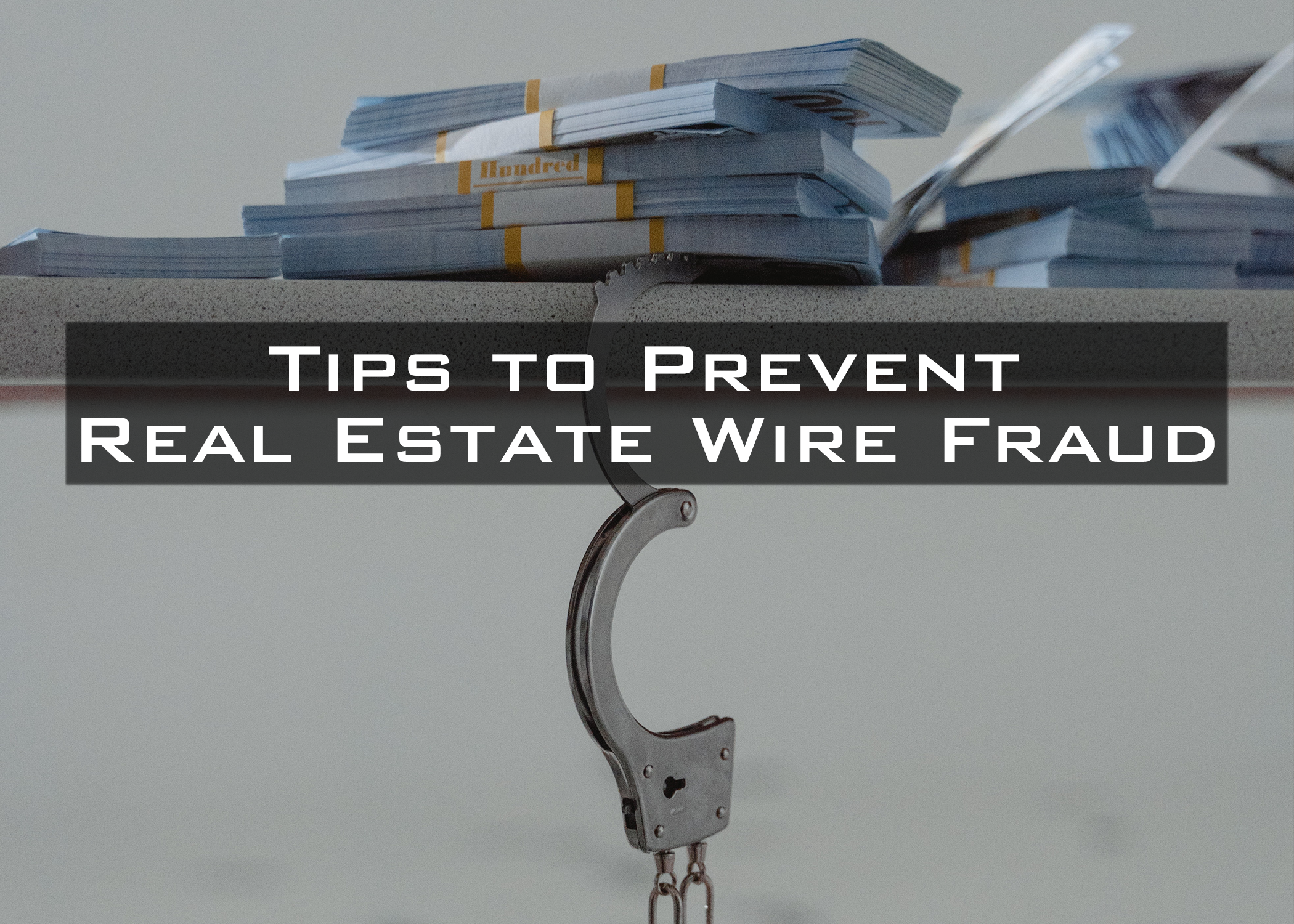
If you’re preparing to buy a home, you know it is a big financial decision. You’ve saved your money, found the perfect property, and now you’re ready to buy. In this moment, it’s imperative that your money ends up in the right hands. Unfortunately, scammers often target homebuyers at this vulnerable moment, when the purchase is imminent, and hundreds of thousands – even millions – of dollars can be stolen in an instant. Through real estate wire fraud, scammers steal trillions of dollars from their victims annually. Read on to learn how hackers perpetrate wire transfer fraud in real estate transactions and how to protect yourself.

In a wire fraud scam, the hacker gains access to the email account of a real estate professional, and sends a message to the homebuyer requesting an urgent transfer of funds via wire.
What is real estate wire fraud?
In this scam, a hacker gains access to the email account of a real estate professional – often a Realtor, lender, or title agent – and sends a message to the homebuyer requesting an urgent transfer of funds via wire. This message often includes instructions to send the money to a new or different account than was previously agreed upon. Scammers construct near-perfect email messages that are almost indistinguishable from those written by the accounts’ actual owners, making it easy to trick homebuyers into transferring their money into the scammer’s bank account.
The coronavirus pandemic has made real estate wire fraud more prevalent than ever. Money.com reports that 5.64 million existing homes were sold in 2020 alone (the most since 2006), and during that year, $1.8 trillion in losses were reported due to real estate wire fraud. To put this in perspective, a third of all real estate transactions in 2020 included a wire fraud attempt. Scammers use the pandemic as an excuse for the urgency of their request, citing lack of staff or positive Covid tests in the office as a reason to send the money quickly and electronically.
The FBI is well aware of this increase and has named this scam “Business Email Compromise” (BEC). Their statistics show this type of fraud didn’t only peak in 2020; it was growing steadily in the ten years preceding as well. The FBI has collected information on the money stolen from homebuyers and their press release on BEC shows that funds are usually transferred to a fraudulent domestic account, after which they are withdrawn quickly. In some cases, the funds are transferred a second time to an international account. Sadly, once the money has been transferred, it’s highly difficult to get it back. Only 12-15% of BEC cases are reported, and just 29% of victims see their money fully recovered.
Unfortunately only 29% of reported wire fraud victims see their money fully recovered.
What is an example of wire fraud in real estate?
Here’s how many real estate wire fraud scams work. A scammer hacks into the email account of someone associated with a real estate sale. In this example, we’ll assume the scammer has hacked into the real estate agent’s email account. The hacker/scammer doesn’t do anything malicious at this point; they simply monitor the email account to learn about the pending real estate transaction.
Then, the homebuyer receives an email from their broker. The email looks normal, like any other from their broker. The message provides fraudulent wiring instructions to send the buyer’s closing funds. Or it may say something has changed and they need the cash-to-close amount wired over right away. They include new bank details and request confirmation as soon as possible. The homebuyer may not be surprised, because they trust their broker and are expecting to send money for closing anyway. So, they arrange for the transfer to take place that day. Upon speaking with their agent later, the homebuyer finds out that the agent never sent the email, and the money – and any chance of buying the house they wanted – has been stolen away.
If you believe you are a victim of real estate wire fraud, contact your bank immediately, and give all relevant information about the transfer.
What should you do if you are a victim of wire fraud?
If you believe you are a victim of real estate wire fraud, it’s important to act quickly. Here are steps to follow as soon as possible after the money transfer has occurred.
- Contact all banks involved in the transaction. Even if you feel embarrassed about the situation, it’s important to talk to your bank and give them all relevant information about the transfer. Remember, this type of fraud is extremely common, and hackers go to great lengths to make fraud emails as convincing as possible. Tell your bank that you suspect fraud and ask them to stop the transfer, and call the recipient bank and ask them not to release the funds to the account holder. Even if the funds are gone, the banks can help authorities trace the money.
- Report the fraud to the Internet Crime Complaint Center (IC3) and then call your local FBI office. The FBI has the ability to stop the transfer of funds in cases of financial fraud. To file an ICS report, click here.

If you lose money due to wire fraud, you may have a few legal options, though it can be tricky.
Can you sue for wire fraud?
If you have lost money due to wire fraud, there are a few legal options available to you. It can be tricky to successfully sue your bank for the losses unless you can prove the bank was negligent before or after the wire transfer, and these circumstances are rare. As shown in a 2019 court case, Peter E. Shapiro, P.A. v. Wells Fargo Bank, it is not enough to claim negligence on the receiving bank’s part because it did not stop the transfer due to a name mismatch. Shapiro claimed that the bank should have noticed that the name of the beneficiary (supposedly his lender’s lawyer) did not match the account holder (the scammer).
However, the judge dismissed the claim since, according to Florida law, banks are allowed to rely on account numbers, not names, when processing wire transfers. As this case shows, banks are often not to blame in cases of wire fraud, despite victims’ claims that banks should do more to stop these shady transactions before they are processed.
There has also been legal precedent for wire fraud victims suing real estate brokers. In the 2018 case Bain v. Platinum Realty, LLC, a homebuyer lost nearly $200,000 due to wire fraud and sued their broker, who had forwarded the buyer a fraudulent email with false wire instructions. The court found that the broker was 85% responsible for the buyer’s losses and entered judgment against the broker for $167,129. While not all cases against real estate brokers will play out the same way, this case shows that buyers can have legitimate basis to hold their Realtors and brokers accountable for the role they play in fraud cases.
Real estate agents should never share wiring instructions via email. In fact, Freestone Properties agents will never email wiring instructions to our clients.
Real Estate Wire Fraud Advisory Form in North Carolina
In response to the massive spike in real estate wire fraud cases, the North Carolina Real Estate Commission added a “Wire Fraud Warning” to listing and buyer agency agreements. It advises buyers and sellers to verify wiring instructions both when receiving funds (in the case of sellers) and sending funds (buyers). This is intended to help educate buyers and sellers about dangers of wire fraud and help them avoid falling victim to scams.

Whenever you are asked to wire money, always call the intended recipient to verify that they requested the transfer. If you suspect fraud, call your bank and your local FBI office immediately.
Tips for Avoiding Real Estate Wire Fraud
The best way to avoid falling victim to a wire fraud scheme is to be cautious, informed, and communicative with all parties involved in the sale of the home so that everyone is on the same page. Having a good understanding of when and where money will change hands (whether in person or digitally), what bank the money will go to, and how much the final amount will be, will help you identify any unusual emails asking for urgent transfers to new bank accounts as scams. Here are some more tips for avoiding wire fraud:
- Set up a strong password for the email account you use to communicate about the purchase as well as your social media accounts. Use two-factor authentication wherever possible.
- Ask your Realtor, lender, and bank about digital safety measures they’ve put in place to keep their clients safe.
- If you do receive a suspicious email, examine it carefully. Does the email host domain for the sender match that of other emails you’ve received from them in the past? It’s a major red flag if they’re suddenly emailing from a Gmail account rather than their normal business email. Check for any minor misspellings in the email address as well, as it could be a close dupe created by a scammer.
- Whenever you are asked to wire money, always call the intended recipient to verify that they requested the transfer. Even if it seems redundant, it is always best to double check before wiring away your savings. And be sure to do this in person or via a TRUSTED phone number. Don’t use the phone number sent to you in the email requesting the wire. Never wire money without double-checking that the wiring instructions are correct.
- Consider sending funds via a certified check instead of a wire.
Buying a Home in Asheville, North Carolina
Are you planning to move to the mountains of Western North Carolina? Our team of experts can help you find the house of your dreams while offering resources, support, and insight along the way. Let us know how we can help – we’d love to hear from you.






Leave a Reply